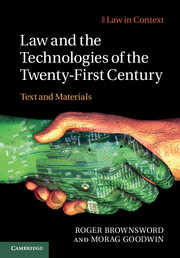Book contents
- Frontmatter
- Contents
- Acknowledgements
- Miscellaneous Frontmatter
- Abbreviations
- Table of cases
- Table of statutes and other public documents
- Part I General introduction
- Part II Regulatory prudence and precaution
- Part III Regulatory legitimacy
- 7 The legitimacy of the regulatory environment: basic ideas
- 8 Key boundary-marking concepts
- 9 Human rights as boundary markers
- 10 A look at procedural legitimacy: the role of public participation in technology regulation
- Part IV Regulatory effectiveness
- Part V Regulatory connection
- Concluding overview
- Index
- References
7 - The legitimacy of the regulatory environment: basic ideas
from Part III - Regulatory legitimacy
Published online by Cambridge University Press: 05 August 2012
- Frontmatter
- Contents
- Acknowledgements
- Miscellaneous Frontmatter
- Abbreviations
- Table of cases
- Table of statutes and other public documents
- Part I General introduction
- Part II Regulatory prudence and precaution
- Part III Regulatory legitimacy
- 7 The legitimacy of the regulatory environment: basic ideas
- 8 Key boundary-marking concepts
- 9 Human rights as boundary markers
- 10 A look at procedural legitimacy: the role of public participation in technology regulation
- Part IV Regulatory effectiveness
- Part V Regulatory connection
- Concluding overview
- Index
- References
Summary
Introduction
In 1990, the European Union established a regulatory regime in response to applications for the licensing and commercial marketing of genetically modified organisms (GMOs). Although Member States retained considerable regulatory powers over the licensing of GMOs, the responsibility for risk assessment and authorisation for products being released throughout the European Union area were shared between the Member States and Community institutions. Under the regime established by Directive 90/220/EC, eighteen genetically modified crops were licensed for sale within the European Union and thousands of field trials were approved.
However, by the late 1990s, faced with strong public protest against GMOs, Member States were refusing to license new products, and even where products had been authorised by the Council of Ministers, individual Member States were invoking the safeguard clause in the Directive to prevent licensing of these products in their own countries. Such was the collapse in confidence of the European regulatory regime for GMOs that by 1999 all new approvals of GMOs for commercial application were stopped. The regulatory framework had failed, but why?
- Type
- Chapter
- Information
- Law and the Technologies of the Twenty-First CenturyText and Materials, pp. 169 - 187Publisher: Cambridge University PressPrint publication year: 2012



